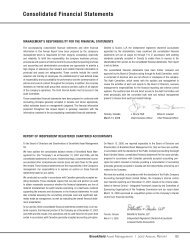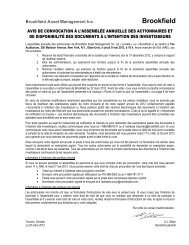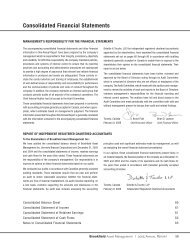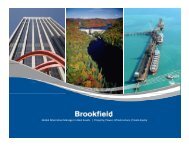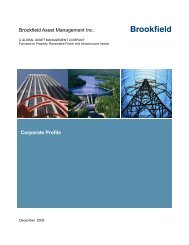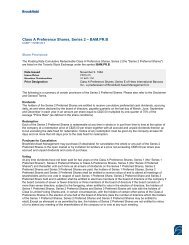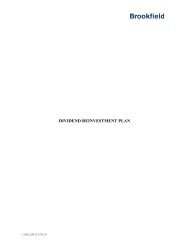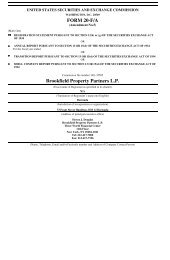FORM 20-F/A Brookfield Property Partners L.P. - Brookfield Asset ...
FORM 20-F/A Brookfield Property Partners L.P. - Brookfield Asset ...
FORM 20-F/A Brookfield Property Partners L.P. - Brookfield Asset ...
- No tags were found...
Create successful ePaper yourself
Turn your PDF publications into a flip-book with our unique Google optimized e-Paper software.
Canadian federal income tax return for any taxation year in which they are allocated income from our companyfrom carrying on business in Canada that is not exempt from Canadian taxation under the terms of an applicableincome tax treaty or convention.Non-Canadian limited partners may be subject to Canadian federal income tax on capital gains realized byour company or the <strong>Property</strong> <strong>Partners</strong>hip on dispositions of “taxable Canadian property” as defined in theTax Act.A non-Canadian limited partner will be subject to Canadian federal income tax on its proportionate shareof capital gains realized by our company or the <strong>Property</strong> <strong>Partners</strong>hip on the disposition of “taxable Canadianproperty”, other than “treaty protected property”, as defined in the Tax Act. “Taxable Canadian property”includes, but is not limited to, property that is used or held in a business carried on in Canada and shares ofcorporations resident in Canada that are not listed on a “designated stock exchange”, as defined in the Tax Act, ifmore than 50% of the fair market value of the shares is derived from certain Canadian properties during the60-month period immediately preceding the disposition. <strong>Property</strong> of our company and the <strong>Property</strong> <strong>Partners</strong>hipgenerally will be “treaty-protected property” to a non-Canadian limited partner if the gain from the disposition ofthe property would, because of an applicable income tax treaty or convention, be exempt from tax under the TaxAct. Our company and the <strong>Property</strong> <strong>Partners</strong>hip are not expected to realize capital gains or losses fromdispositions of “taxable Canadian property”. However, no assurance can be given in this regard. Non-Canadianlimited partners will be required to file a Canadian federal income tax return in respect of a disposition of“taxable Canadian property” by our company or the <strong>Property</strong> <strong>Partners</strong>hip unless the disposition is an “excludeddisposition” for the purposes of section 150 of the Tax Act. However, non-Canadian limited partners that arecorporations will still be required to file a Canadian federal income tax return in respect of a disposition of“taxable Canadian property” that is an “excluded disposition” for the purposes of section 150 of the Tax Act iftax would otherwise be payable under Part I of the Tax Act by such non-Canadian limited partners in respect ofthe disposition but is not because of a tax treaty (otherwise than in respect of a disposition of “taxable Canadianproperty” that is “treaty-protected property of the corporation). In general, an “excluded disposition” is adisposition of property by a taxpayer in a taxation year where: (i) the taxpayer is a non-resident of Canada at thetime of the disposition; (ii) no tax is payable by the taxpayer under Part I of the Tax Act for the taxation year;(iii) the taxpayer is not liable to pay any amounts under the Tax Act in respect of any previous taxation year(other than certain amounts for which the CRA holds adequate security); and (iv) each “taxable Canadianproperty” disposed of by the taxpayer in the taxation year is either: (i) “excluded property” (as defined insubsection 116(6) of the Tax Act); or (ii) is property in respect of the disposition of which a certificate undersubsection 116(2), (4) or (5.2) has been issued by the CRA. Non-Canadian limited partners should consult theirown tax advisors with respect to the requirements to file a Canadian federal income tax return in respect of adisposition of “taxable Canadian property” by our company or the <strong>Property</strong> <strong>Partners</strong>hip.Non-Canadian limited partners may be subject to Canadian federal income tax on capital gains realized onthe disposition of our units if our units are “taxable Canadian property”.Any capital gain arising from the disposition or deemed disposition of our units by a non-Canadianlimited partner will be subject to taxation in Canada, if, at the time of the disposition or deemed disposition, ourunits are “taxable Canadian property” of the non-Canadian limited partner, unless our units are “treaty-protectedproperty” to such non-Canadian limited partner. In general, our units will not constitute “taxable Canadianproperty” of any non-Canadian limited partner at the time of disposition or deemed disposition, unless (a) at anytime in the 60-month period immediately preceding the disposition or deemed disposition, more than 50% of thefair market value of our units was derived, directly or indirectly (under proposed amendments to the Tax Actannounced by the Minister on August 27, <strong>20</strong>10, excluding through a corporation, partnership or trust, the sharesor interest in which were not themselves “taxable Canadian property”), from one or any combination of: (i) realor immovable property situated in Canada; (ii) “Canadian resource property” as defined in the Tax Act;(iii) “timber resource property” as defined in the Tax Act; and (iv) options in respect of or interests in, or for civillaw rights in, such property, whether or not such property exists, or (b) our units are otherwise deemed to be34



